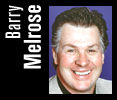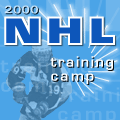|
Training camp is a permanent fixture in the NHL season. But it's changed a lot over the years. We asked our NHL analysts how camp has changed -- as well as to share some of their own training-camp anecdotes. Here are their responses.

|
The biggest difference in NHL training camp today is the condition of the athletes. Twenty years ago, players used training camp to get in shape; now, they come to camp in shape. Players train all year long, and a lot of them have personal trainers. Camp is full speed right from the start -- physicals on the first day, and you get into hard workouts the second day. That would have never happened 20 years ago.
The guys who are coming off winning seasons love training camp and can't wait to be together. If you're a winning team, training camp is a happy time. For a bad team, the sentiment is often, "Oh boy, here we go again" -- they all hate each other.
My first year in L.A. was a great camp. I was a new coach, and the organization was optimistic and energetic. They responded to what I was trying to do and were open to hearing it because they hadn't won in L.A. yet. I was excited because I got to coach Wayne Gretzky for the first time, and we had a lot of other great players. We went on to have the best 25-game start the Kings had ever had.
The worst camp was my third year in Los Angeles. We missed the playoffs the year before, had some injuries, and some popular players had been traded over the summer. In addition, there were front office problems. It was chaos. Nothing was right, and everything was wrong. We never really did get on track, missing the playoffs again, and I ended up getting fired. What a difference a few years can make. |

|
Through it's agreement, the NHLPA stepped in and allotted only a certain amount of time that players can actually spend on the ice. While in past years, it seemed like players spent hours skating and getting into shape for regular season, now it's a maximum of three hours of activity a day, both on and off ice. Now, players are in such great shape that they aren't using camp to get into shape. They are using camp to make an impression.
Since I come from a city of 100,000 people outside of Ottawa, I received a rude wake-up call about how large Chicago is during my first training camp. We took a school bus from our hotel in downtown Chicago to a really bad area near Madison Avenue where the old Chicago Stadium stood. On our way to the stadium, we had to stop for several minutes because there was a large ambulance stalling traffic near a home where five bodies were being taken out. That experience told me two things: "This is one heck of a big city, and this is not a very good area."
One of my favorite memories was the first time I walked up the steps in the old Chicago Stadium. There were 24 steps from the locker room down below to the ice surface. I was walking alongside great players like Denis Savard, Doug Wilson and Al Secord wearing a tight, cotton Blackhawks jersey that seemed so NHL. That was quite fantastic, something I'll never forget. |

|
Camp is significantly shorter than it used to be, and now, it's more useful for management to evaluate players. Players know that if they don't come to camp in pretty close to top shape, they will possibly have a difficult start. Because the salaries are so high these days, a bad start could cost millions of dollars if a player is in the last year of a deal or on the verge of being a free agent. It's all connected. In addition, players must arrive at camp ready to play because teams, in an effort to generate revenue, schedule as many as 10 preseason games over a three-week span.
When I played, a lot of players came to camp overweight -- some still do. Look at what Norm Maracle did in Atlanta last season. He wanted to be a No. 1 goalie in the NHL, yet he arrived at camp overweight. You see what happened to his season because of it. Players stand a chance of jeopardizing their entire season if they come to camp out of shape. That has always held true. But now, players have less time in camp to get into playing condition.
I used to hate training camp even though I'd be in great shape within two or three days. The guys would hate me because I was always in good shape right away. That was something that God gave me. I didn't do anything during the summer to stay in shape, except run for three or four weeks before camp started.
But I used to hit what I called the fourth-day blues. I hated the fourth day of training camp. On the first, day there was some newness. On the second day, I started to get fatigued and experienced muscle soreness. On the third day, all the negative feelings were growing. And on the fourth day, I would hit an emotional and physical lull, where my body and mind would get really fatigued. It usually took me a few days to get out of that funk. They were the most depressing days of camp. I realized I still had four more weeks to endure. |

|
Not to be a broken record, but players in the NHL today look after themselves 12 months a year.They virtually don't take any time off. Maybe a two week vacation, some of them not even that, and they're right back in the gym. Back in the '50s, the old guys used to come to camp for the express purpose of getting in shape; that?s why they called it training camp.
I remember my very first training camp with Montreal. I was scared to death. You worry, questioning whether you'll fit in. I questioned things. Am I in good enough shape? Are these guys as good as they look when you get on the ice with them? What will it be like to be on the ice with Yvan Cournoyer, Larry Robinson, Guy Lafleur, Ken Dryden? I'm from Winnipeg, so I had the 1,500 mile drive to think about how nervous I was. It was going to be a two-day drive; I was supposed to report on a Thursday, so I left home on Tuesday. The day I left, a letter arrived at home saying that camp had been moved back to Sunday. I arrive Thursday, check in, and find out it will be a few more days before we start camp. So, on top of being nervous, now I haven't skated for six days. It was a disaster. At that time of year, just before camp starts, you want to be skating every day and have as good an edge as you possibly can. I remember the first day of camp was awful; back then, we had two-a-days and no personal trainers in the offseason. On top of being nervous, not skating for six days really left me dragging. I can laugh about it now, but I remember thinking I was going to die that first day. Some of those superstars I was playing with were so unbelievably fast. I was thinking, 'my God, how am I going to do this?' |
| |
|







